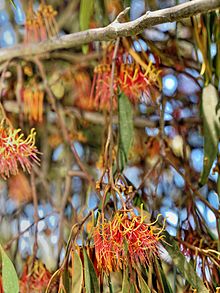Amyema pendula, also known as drooping mistletoe or furry drooping mistletoe,[2] is a species of flowering plant, an epiphytic hemiparasitic plant of the family Loranthaceae, found attached to several species of Australian eucalypt and occasionally on some species of Acacia. It is endemic to south-eastern Australia. It is the most common mistletoe in Victoria, especially on the coastal side of the Great Dividing Range. It has shiny leaves and red flowers arranged in groups of 3 or 4. It is distinguished from the similar Amyema miquelii through the lack of individual stalks on the flowers.
| Amyema pendula | |
|---|---|

| |
| Amyema pendula subsp. pendula on Acacia tree | |
| Scientific classification | |
| Kingdom: | Plantae |
| Clade: | Tracheophytes |
| Clade: | Angiosperms |
| Clade: | Eudicots |
| Order: | Santalales |
| Family: | Loranthaceae |
| Genus: | Amyema |
| Species: | A. pendula
|
| Binomial name | |
| Amyema pendula | |

| |
| Collections data for A. pendula from the Australasian Virtual Herbarium | |

There are two subspecies:
- A. pendula subsp. pendula with short flower stalks and anthers to the east of the Great Dividing Range
- A. pendula subsp. longifolia with longer stalks and anthers to the west and inland.
Taxonomy
editAmyema pendula was first described in 1827 as Loranthum pendulus by Franz Sieber in Sprengel's Curae Posteriores.[3] It was transferred to the genus, Amyema in 1894 by Philippe Édouard Léon Van Tieghem[4]
References
edit- ^ "Amyema pendula". Australian Plant Name Index (APNI), IBIS database. Centre for Plant Biodiversity Research, Australian Government.
- ^ Watson, David (2011). Mistletoes of Southern Australia. Melbourne: CSIRO Publishing. p. 199. ISBN 9780643100831.
- ^ Sieber, F. (1827), Sprengel, C.P.J. (ed.), "Classis VI", Systema Vegetabilium Edn. 16 (in Latin), 4 (2): 139
- ^ M. Ph. Van Tieghem (January 1894). "Sur Le Groupement Des Espèces En Genres Dans Les Loranthacées A Calice Dialysépale Et Anthéres Basifixes". Bulletin de la Société Botanique de France (in French). 41 (6): 507. doi:10.1080/00378941.1894.10831632. ISSN 0037-8941. Wikidata Q54801450.